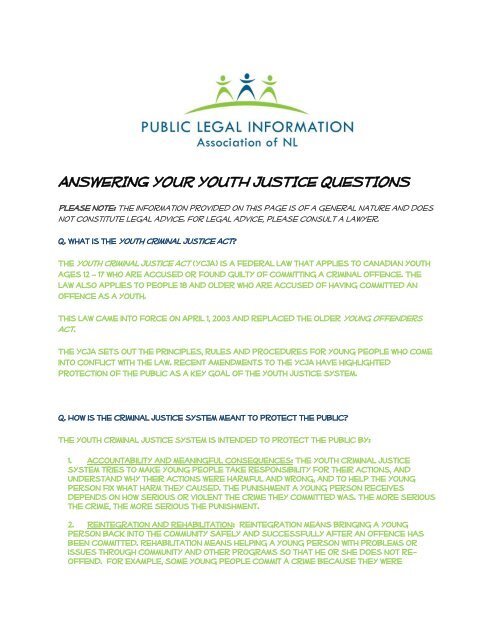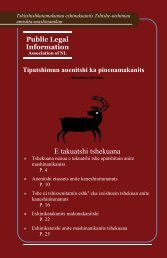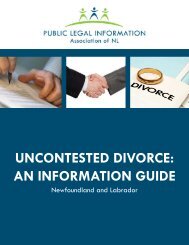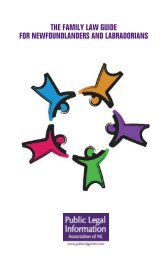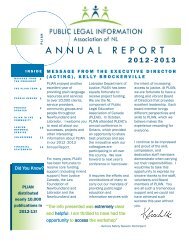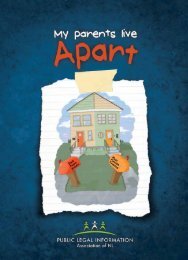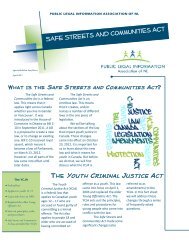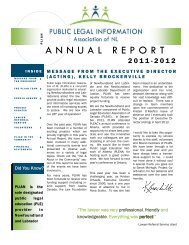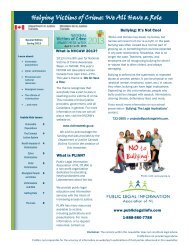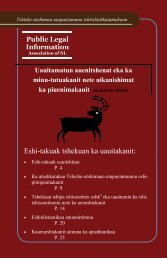answering your youth justice questions - Public Legal Information
answering your youth justice questions - Public Legal Information
answering your youth justice questions - Public Legal Information
You also want an ePaper? Increase the reach of your titles
YUMPU automatically turns print PDFs into web optimized ePapers that Google loves.
ANSWERING YOUR YOUTH JUSTICE QUESTIONS<br />
Please Note: The information provided on this page is of a general nature and does<br />
not constitute legal advice. For legal advice, please consult a lawyer.<br />
Q. What is the Youth Criminal Justice Act?<br />
The Youth Criminal Justice Act (YCJA) is a federal law that applies to Canadian <strong>youth</strong><br />
ages 12 – 17 who are accused or found guilty of committing a criminal offence. The<br />
law also applies to people 18 and older who are accused of having committed an<br />
offence as a <strong>youth</strong>.<br />
This law came into force on April 1, 2003 and replaced the older Young Offenders<br />
Act.<br />
The YCJA sets out the principles, rules and procedures for young people who come<br />
into conflict with the law. Recent amendments to the YCJA have highlighted<br />
protection of the public as a key goal of the <strong>youth</strong> <strong>justice</strong> system.<br />
Q. How is the criminal <strong>justice</strong> system meant to protect the public?<br />
The <strong>youth</strong> criminal <strong>justice</strong> system is intended to protect the public by:<br />
1. Accountability and meaningful consequences: The <strong>youth</strong> criminal <strong>justice</strong><br />
system tries to make young people take responsibility for their actions, and<br />
understand why their actions were harmful and wrong, and to help the young<br />
person fix what harm they caused. The punishment a young person receives<br />
depends on how serious or violent the crime they committed was. The more serious<br />
the crime, the more serious the punishment.<br />
2. Reintegration and Rehabilitation: Reintegration means bringing a young<br />
person back into the community safely and successfully after an offence has<br />
been committed. Rehabilitation means helping a young person with problems or<br />
issues through community and other programs so that he or she does not reoffend.<br />
For example, some young people commit a crime because they were
pressured by their friends. The right services offered to them by the community<br />
will help them learn to stand up to peer pressure.<br />
3. Prevention: Crime prevention means that our system in Canada tries to deal<br />
with the problems or issues that may make a young person commit a crime in the<br />
first place.<br />
Q. What happens if a child under 12 years of age commits a crime?<br />
Children under the age of 12 years are not dealt with by the formal <strong>youth</strong> <strong>justice</strong><br />
system. This means that they are not arrested or will not go to court. The majority<br />
of <strong>youth</strong> under 12 are not involved in crimes. The system works under the assumption<br />
that the small numbers of <strong>youth</strong> under 12 who do engage in serious crimes can be<br />
dealt with more effectively by child welfare or mental health agencies when<br />
parents cannot deal with the problems.<br />
Q. Does a young person between aged 12 to 17 always go to court if they come into<br />
conflict with the law?<br />
No. There are other options available called “extrajudicial measures” that allow<br />
<strong>youth</strong> to be dealt with outside of court when appropriate. Instead of going to court<br />
and having a judge decide the consequence for the offence, extrajudicial<br />
measures offer an alternative. There are different types of extrajudicial<br />
measures such as police warnings, Crown cautions, conferencing, referrals to<br />
community programs and extrajudicial sanctions.<br />
The police are now required by law to keep a record of any extrajudicial measures<br />
used against a <strong>youth</strong>. Having a record of these informal incidents will allow the<br />
police and courts to respond more effectively to any future offences committed<br />
by a young person.<br />
Q. What are extrajudicial sanctions?<br />
These may be used to deal with a young person alleged to have committed an<br />
offence that cannot be dealt with by a warning, caution or referral because of a<br />
serious offence, previous offence or any other aggravating circumstance.<br />
Extrajudicial sanctions may not be used when a young person denies participation<br />
or involvement in the offence or expresses the wish to have the charge dealt with<br />
by a <strong>youth</strong> <strong>justice</strong> court. Extrajudicial sanctions may only be used if the young<br />
person accepts responsibility for the offence and agrees to be subject to the<br />
sanction. If a young person fails to comply with the terms and conditions of the<br />
sanction, the case may proceed through the court system.
Q. Have there been any major changes to the YCJA?<br />
Yes, the Safe Streets and Communities Act made some significant changes (also<br />
referred to as amendments) to the YCJA. Those changes came into effect on<br />
October 23, 2012.<br />
Q. How has the Safe Streets and Communities Act changed the YCJA?
Q: Do the police have to read a <strong>youth</strong> accused their rights if arrested?<br />
Yes, if arrested a <strong>youth</strong> must be advised of their rights without delay by police<br />
including the right to a lawyer, to have parents present, and to know for what<br />
crime he/she has been arrested.<br />
Q: How is a <strong>youth</strong> accused supposed to get a lawyer?<br />
Under the Youth Criminal Justice Act, young people must be given an opportunity to<br />
obtain counsel (a lawyer). If the <strong>youth</strong> is not represented by a lawyer, the court<br />
will advise him/her of their right to speak with a lawyer. Also, if a <strong>youth</strong> can’t afford<br />
a lawyer and meets the required criteria, he/she may be entitled to a <strong>Legal</strong> Aid<br />
lawyer. In some cases the Attorney General may be ordered to appoint a lawyer on<br />
a <strong>youth</strong> accused’s behalf.<br />
Q. Is a <strong>youth</strong>’s identity kept private if they are charged with a criminal offence?<br />
As a general rule, the Youth Criminal Justice Act (YCJA) protects the privacy of<br />
young persons who are accused or found guilty of a crime by keeping their identity<br />
and other personal information confidential. There are exceptions to this general<br />
rule:<br />
<br />
<br />
<br />
<br />
<br />
<br />
where the young person is found guilty of a crime and the court imposes an<br />
adult sentence;<br />
where the young person has received a <strong>youth</strong> sentence for a violent offence<br />
and the court determines that the young person poses a significant risk of<br />
committing another violent offence and the lifting of the ban is necessary to<br />
protect the public against that risk;<br />
where the publication is made in the course of the administration of <strong>justice</strong><br />
(for example, the inclusion of a young person’s name in a court document for<br />
use by court administrators);<br />
where a young person alleged to have committed a crime is at large and a<br />
court determines that the young person is a danger to others and publication<br />
is necessary to apprehend him or her (publication may be permitted for up to<br />
five days);<br />
where a young person has turned 18, he or she may publish or agree to the<br />
publication of their information provided they are not in custody at the time of<br />
publication; and<br />
where a young person has applied to the court, the court may make an order<br />
permitting publication if it is satisfied that the publication would not be<br />
contrary to the young person’s best interests or the public interest.
Q. What kind of <strong>youth</strong> sentence will a <strong>youth</strong> receive if convicted of a crime?<br />
If a <strong>youth</strong> is convicted of a crime, a judge will decide on an appropriate sentence<br />
(punishment). The type of sentence received will depend upon the crime committed,<br />
whether the <strong>youth</strong> has been convicted of a crime before, the circumstances<br />
surrounding the crime, and many other factors.<br />
Q. Can a <strong>youth</strong> ever be sentenced as an adult?<br />
Yes. In certain circumstances and for certain types of offences, a judge may<br />
decide to sentence a young person as an adult.<br />
The Crown (government lawyer) must consider asking for an adult punishment if a<br />
<strong>youth</strong> is charged with certain crimes (such as murder, attempted murder,<br />
manslaughter, and aggravated sexual assault). If the Crown chooses not to seek<br />
an adult sentence they must inform the court that the Crown considered asking<br />
for an adult sentence, but decided not to ask for it.<br />
Q. If a <strong>youth</strong> gets placed in custody, will the <strong>youth</strong> be put in with adults?<br />
No. The law is very specific that <strong>youth</strong> under 18 years of age have to serve custody<br />
in <strong>youth</strong> facilities regardless of whether they are given a <strong>youth</strong> or adult<br />
punishment. This means that <strong>youth</strong> who receive custody sentences will serve their<br />
sentence in a place with other <strong>youth</strong>. If a <strong>youth</strong> reaches the age of 18 while serving<br />
a <strong>youth</strong> custody sentence, the YCJA sets out a process for transferring the <strong>youth</strong><br />
to an adult facility.


